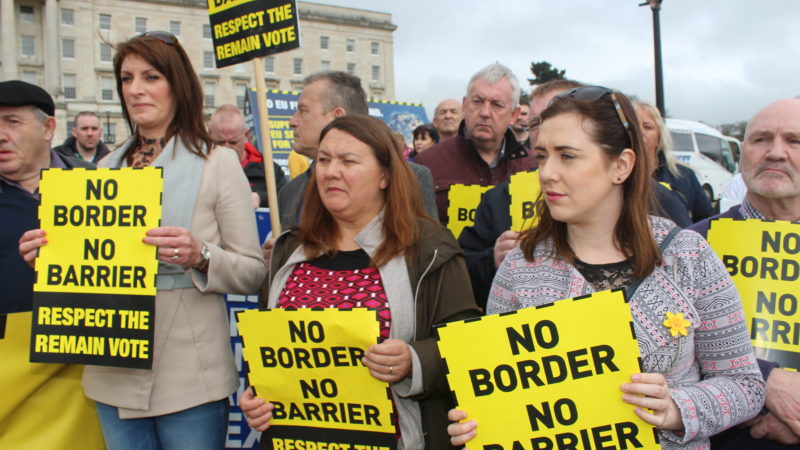This stalemate started with Brexit and will end in Brussels, says Queen's University Belfast's Dr Peter McLoughlin.

After more than 500 days of stalemate, Northern Ireland has surpassed the record previously set by Belgium for the longest run in peacetime without a working government.
The trigger for the collapse of Stormont’s power-sharing institutions concerned a relative anodyne issue – the implication of the DUP leader Arlene Foster in a seriously flawed renewable energy scheme. However, there were a range of other factors which created a breakdown in trust between Foster’s party and Sinn Féin.
Among these were the DUP’s opposition to Sinn Féin’s proposal of an act to help preserve and promote the Irish language and its refusal to countenance gay marriage. On top of these, there were issues relating to Northern Ireland’s past conflict.
Arguably, though, the key factor that continues to prevent an agreement to restore power-sharing in Northern Ireland is the same issue that has destabilised politics right across the UK: Brexit.
The day after the vote to leave the EU in 2016, Sinn Féin called for a vote on Irish unity. This was linked to the threat that Brexit could re-establish a hard border in Ireland, with serious economic implications for both parts of the island. Sinn Féin argues that this might change the attitudes even of many unionists in Northern Ireland, creating a momentum towards republicans’ long-standing goal of reunification.
The DUP naturally opposed such suggestions. And, indeed, it had backed the Leave campaign in the referendum. So, after the surprising loss of the Westminster majority for the Conservatives in 2017’s election, it was much less surprising that the DUP came to their aid with a confidence-and-supply accord.
The underlying tension
Having a say in the governance of the UK as a whole, and helping to deliver the claimed “will of the British people” on Brexit, has helped burnish the DUP’s unionist credentials. Also, the Tory-DUP deal involved a commitment to increase public spending in Northern Ireland. This sold well with the DUP’s supporters, who, for many years, have chafed at the changes of the peace process, interpreted as rewarding republicans. Conversely, republicans now chafe at the DUP’s enhanced political influence. They note that a majority in Northern Ireland voted Remain, while support for the EU in the Irish Republic remains high.
Brexit has thus revived the ideologies of Irish nationalism and Ulster unionism, and reignited their most central dispute – continued union with Britain or unification with Ireland. Brexit has simply created a new arena for an age-old contest.
This underlying tension is arguably the real reason for the continued failure of efforts to resolve other disagreements between the DUP and Sinn Féin and restore power-sharing. Indeed, these other issues are far less challenging than those previously resolved through the peace process.
Agreeing to disagree
This is not to downplay the importance of Irish speakers in Northern Ireland having the same protections enjoyed by those using other indigenous languages across the UK and Ireland, or the rights of the gay community to marriage equality as in any other part of these islands. However, issues like the decommissioning of IRA weapons, policing reform, or the release of paramilitary prisoners under the terms of the Good Friday Agreement proved far more controversial. Yet they were all delivered, and so established the basis for Sinn Féin and the DUP to work together in government for nearly a decade.
However, the peace process did not reconcile Sinn Féin and the DUP: it forced them to be friends. Specifically, the British and Irish governments made clear that they could only have power if they shared power. The unity of political purpose between London and Dublin, so evident and successful in the early years of the peace process, has been seriously damaged by Brexit.
Though there are very particular implications for Northern Ireland and the Irish border, Brexit has created wider challenges for London and Dublin. Given the highly important all-Ireland and UK dimensions of Irish trade, and nearly half a century of British integration with Europe, the outcome of Brexit could have massively disruptive effects on either or both national economies.
An uncomfortable pact
This has often left London and Dublin at odds in the course of the Brexit negotiations. The DUP’s role in supporting the Westminster government has only complicated matters further. While London and Dublin remain divided over the direction of Brexit, however, they cannot lead a co-ordinated effort to force the Northern Ireland parties to resolve their differences and restore power-sharing at Stormont.
This creates a Catch-22. Just as the issue of the Irish border remains the chief obstacle to an agreement on Brexit, so Brexit remains the chief obstacle to an agreement at Stormont. It seems then that a political deal in Belfast will only emerge as we near a political deal in Brussels.
Northern Ireland may have taken the Belgian title for the longest period without governance, but ironically it is in the Belgian capital where any move to end Northern Ireland’s stalemate will likely develop.
Dr Peter McLoughlin is a Lecturer in Politics at Queen’s University Belfast.
This article was originally published on The Conversation. Read the original article.
To reach hundreds of thousands of new readers we need to grow our donor base substantially.
That's why in 2024, we are seeking to generate 150 additional regular donors to support Left Foot Forward's work.
We still need another 117 people to donate to hit the target. You can help. Donate today.



